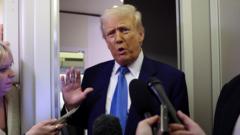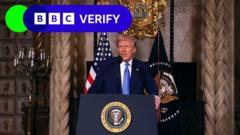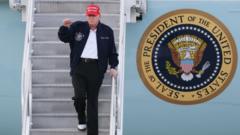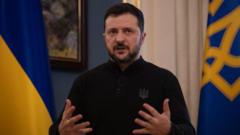The 2025 Munich Security Conference revealed a stark shift in U.S. rhetoric as Vice President JD Vance and Defense Secretary Pete Hegseth suggested a potential realignment towards Russia, echoing Vladimir Putin's long-standing desires for greater influence in Europe.
Concerns Rise Over U.S. Shift Toward Russia as Administration's Remarks Resurface

Concerns Rise Over U.S. Shift Toward Russia as Administration's Remarks Resurface
Recent comments from Trump's cabinet officials amplify fears of a potential U.S. alignment with Moscow, raising alarms among European allies.
In February 2025, during what has become a pivotal annual security conference in Munich, officials from President Trump's administration raised eyebrows with their remarks regarding U.S. foreign policy in Europe. This year marked a significant departure from the longstanding U.S. commitment to transatlantic alliances, prompting discussions about a possible alignment with Russia.
At the conference, Vice President JD Vance and Defense Secretary Pete Hegseth signaled a potential shift in priorities, suggesting that the U.S. may be more interested in partnering with Moscow rather than maintaining its traditional ties with European allies. Their comments elicited alarm among attendees, who recall Russian President Vladimir Putin's historical demands for an altered power dynamic in Europe.
Putin's ambition to expand Russia's influence in Europe was first articulated dramatically in 2007, when he called for a rollback of American power and a rebalancing that favored Moscow. Although he did not achieve this aim at the time, recent U.S. rhetoric indicates an opening that he is likely to exploit, analysts warn.
Experts, including Andrew S. Weiss from the Carnegie Endowment for International Peace, contend that a pivot away from Europe could allow Putin to achieve aims he has coveted for decades. "The Kremlin has long dreamt of diminishing America's role as the backbone of European security," Weiss noted. The ramifications of such a move could reshape European security architecture and embolden Russian ambitions beyond Ukraine.
The current U.S. administration's comments have raised pressing questions about the future of NATO and the collective security framework that has defined transatlantic relations since the Cold War. As discussions continue, both analysts and diplomats will closely monitor any developments that suggest an enduring shift in U.S. foreign policy priorities, especially in relation to Russia and its ambitions in Europe.























